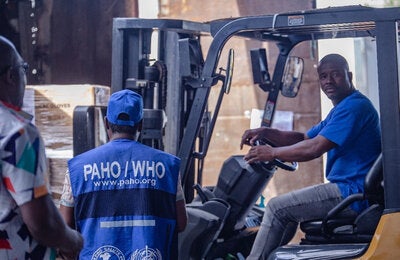Monday, April 28, 2008-The regional heads of the Economic Commission for Latin America and the Caribbean (ECLAC), the Pan American Health Organization (PAHO), UNDP (United Nations Development Program), UNFPA (United Nations Population Fund), UNICEF (the United Nations Children's Fund), and WFP (the United Nations World Food Programme), issued an urgent call on the governments of Latin America and the Caribbean to take timely action to ensure the protection of children and pregnant and lactating women against soaring food prices.
"A rapid response now could prevent millions of the most vulnerable people in Latin American and the Caribbean from hunger and under-nutrition, given their vulnerable conditions and greater susceptibility to illness and disease, as a result of sharp increases in food prices," the organizations said in a joint statement.
According to recent data released by ECLAC, continued high food prices, which have risen approximately 80 per cent since 2006, could plunge an estimated ten million people into extreme poverty and in need of urgent assistance. Another ten million people would find themselves reduced to living below the poverty line, barely able to cope. Currently 190 million people are poor 70 million are extremely poor.
In all cases, children bear a disproportionate burden and 22 million families depend on food aid through conditional cash transfers.
An analysis conducted by WFP on how food prices have affected the populations in rural communities revealed that people today purchase 50% less food than they did 18 months ago with the same amount of money. This means their nutritional intake, on an already poor diet, could be cut by half.
Besides the increase in commodity prices, Latin America and the Caribbean face increasing emergencies caused by natural disasters. The latest hurricane season lasted longer than those of previous years, and was particularly harsh with two exceptional category 5 storms starting the season, and a host of other storms repeatedly hitting the region. This situation has severely damaged crops and agricultural activity, and increases food insecurity and vulnerability of more and more people, especially women and children, and is threatening development gains in the region.
During the World Economic Forum on Latin America in Cancun this month, the heads of state of several countries warned that the impact of climbing food and oil prices could also undo recent gains that their economies have made.
The Presidents warned these were conditions creating a "perfect storm" which might become a hurricane that could upset not only the economies but also the stability of their countries. Violent riots over high food prices recently erupted in Haiti, leaving five people dead and leading to the resignation of Prime Minister Jacques Edouard Alexis.
"We need to take urgent steps to protect the most vulnerable people for ethical and economic reasons, particularly children who represent the region's future. As a first step we need broad based national and international support for emergency food interventions and a strengthening of nutritional safety nets. This must be complemented by in-depth action at the policy level including strengthening of cash transfer programs to ensure that people have access to the necessary amounts of nutritious food. Actions directed to sustainable development including support to small farmers are also key", said the statement by Jose Luis Machinea, Executive-Secretary of ECLAC, Mirta Roses, Director of PAHO, Rebeca Grynspan, UNDP Regional Director, Marcela Suazo, UNFPA Regional Director, Nils Kastberg, UNICEF Regional Director for the Americas, and Pedro Medrano, WFP Regional Director.
Further the UN regional agencies said they are ready to provide immediate technical expertise and supplies to support governments in overcoming the current food crisis, including: safety nets, mother and child health interventions, and school feeding programs.
The Regional Ministerial Conference on the Eradication of Child Under-nutrition will be held in May 5-6 in Santiago de Chile, (http://www.erradicarladesnutricion.cl/) and will consider practical and coordinated responses to the current food price crisis, particularly strengthening south-south cooperation to address this major challenge. The meeting will be hosted by the President of Chile, Michelle Bachelet, and will be attended by the Secretary general of the Organization of American States (OAS), Jose Miguel Insulza, as well as Ministers of Health and Social Protection from 34 countries in Latin America and the Caribbean.
About ECLAC
ECLAC, which is headquartered in Santiago, Chile, is one of the five regional commissions of the United Nations. It was founded with the purpose of contributing to the economic development of Latin America, coordinating actions directed towards this end, and reinforcing economic ties among countries and with other nations of the world. The promotion of the region's social development was later included among its primary objectives.
About PAHO
The Pan American Health Organization, founded in 1902, works with all the countries of the Americas to improve the health and quality of life of their peoples. It serves as the Regional Office of the World Health Organization (WHO).
About UNDP
UNDP is the UN's global development network, an organization advocating for change and connecting countries to knowledge, experience and resources to help people build a better life. We are on the ground in 166 countries, working with them on their own solutions to global and national development challenges. As they develop local capacity, they draw on the people of UNDP and our wide range of partners.
About UNFPA
The United Nations Population Fund, is an international development agency that promotes the right of every woman, man and child to enjoy a life of health and equal opportunity. UNFPA supports countries in using population data for policies and programmes to reduce poverty and to ensure that every pregnancy is wanted, every birth is safe, every young person is free of HIV/AIDS, and every girl and woman is treated with dignity and respect.
About UNICEF
UNICEF is on the ground in over 150 countries and territories to help children survive and thrive, from early childhood through adolescence. The world's largest provider of vaccines for developing countries, UNICEF supports child health and nutrition, good water and sanitation, quality basic education for all boys and girls, and the protection of children from violence, exploitation, and AIDS. UNICEF is funded entirely by the voluntary contributions of individuals, businesses, foundations and governments. Please refer to www.unicef.org.
About WFP
The United Nations World Food Programme (WFP) is the world's largest humanitarian agency: this year, WFP plans to feed more than 70 million people in around 80 countries. WFP now provides RSS feeds to help journalists keep up with the latest press releases, videos and photos as they are published on wfp.org. For more details please click here.
For more information please contact:
Alejandro Chicheri, WFP (Panama) Tel. +(507)-317-3900, Cell. +507-6675-0617 alejandro.chicheri@wfp.org
Pilar Bascuñán, ECLAC (Chile) Tel. +(56-2) 210-2380-210-2149, (56-2) 2281947 dpisantiago@cepal.org
Daniel Epstein, PAHO (Washington) Tel. (202) 974-3459, epsteind@paho.org
Omar Gharzeddine, UNFPA (Mexico City) Tel: +(52) 55 5250-7977 gharzeddine@ unfpa.org
Pablo Basz, UNDP Tel: +(212) 906-5382 pablo.basz@undp.org
Wivina Belmonte, UNICEF América Latina y Caribe (Panama) Tel. + (507) 301 7484 wbelmonte@unicef.org



